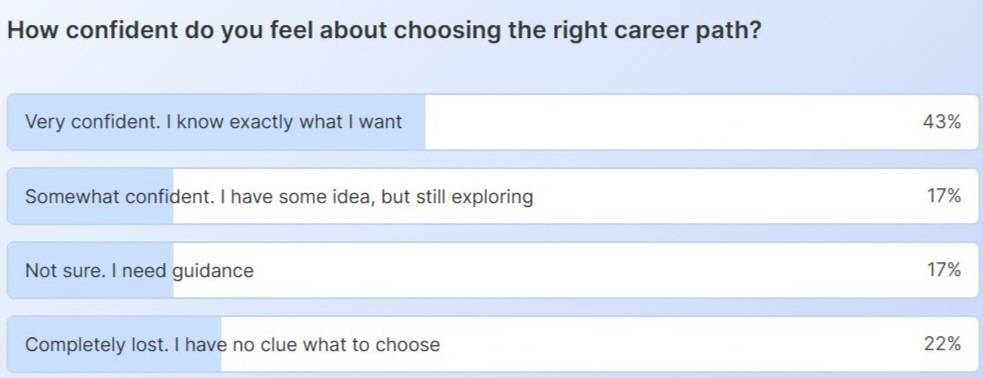/ Boards / All Boards articles / Majority of Students Struggle with Career Clarity: Shiksha Poll Reveals Growing Need for Guidance
Majority of Students Struggle with Career Clarity: Shiksha Poll Reveals Growing Need for Guidance
Md Shahzad
Senior Executive - Content
Updated on Nov 6, 2025 16:37 IST
A recent poll by Shiksha uncovers that more than half of the students are still unsure or completely lost about which career path to choose, highlighting the urgent need for proper guidance and support. Read on to understand what Shiksha Poll Reveals.
Shiksha has recently conducted a poll to know how confident the class 10 and 12 students feel while choosing their career path. This reveals that the candidates are required guidance and support for the selection of career options. Read on to understand what the Shiksha Poll result reveals.
Deciding upon a career option is one of the most vital and challenging choices. While choosing a career option, students must act with due precaution, as it shapes their future. In India, many class 10 and 12 students feel perplexed or utterly lost at the time of choosing a career option. A recent poll conducted by Shiksha.com reveals that most of the students struggle while choosing a career option. They should know about the poll results conducted by us to become more aware of how they can get career support and guidance.
Only 43 percent of students feel confident about their career choice.

The survey reported that less than half of the students, 43 per cent, feel very confident about their career planning. These candidates were very sure about their understanding of the future plan. Early planning, exposure, and support will surely help students falling under this category. Nevertheless, still a majority of the students are struggling while selecting a career option.
More than half still feel confused or lost.
An astonishing 57 percent of students have admitted that they are confused while opting for a career option. 17 percent of students said they are somewhat confident, having some idea, but they are still exploring the options. On the other hand, another 17 percent of them think they are not sure about their career choice and require guidance to opt right career path. Also, 22 percent of students have no certainty about their career options.
How can we help students make better career choices?
It is very essential to help students become confident in making career choices. Candidates can also go for career counseling sessions, mentorship programs, and even online counseling sessions. It will help them understand their strengths and areas of interest. Parents and teachers should also help their children in making their career choices.
Videos you may like
About the Author

Md Shahzad
Senior Executive - Content
 Call 8585951111
Call 8585951111
Shahzad carries 8+ years of editorial experience in various domains of the education sector, including but not limited to Boards, Engineering, Medical, MBA, and many more. He has been helping students by providing v
Read Full Bio